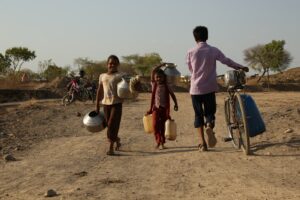IPCC REPORT: Climate change has already caused ‘widespread losses and damages’
The new IPCC Report highlights the urgency of prioritizing timely, ambitious, and coordinated action to address the climate crisis.
The report, which was published today (February 28), highlights that human-induced climate change has already caused widespread adverse impacts and related losses and damages to nature and people.
These impacts are observed unequally, with the vulnerability of ecosystems and people to climate change differing substantially among and within regions.
The authors highlight that this is driven by patterns of intersecting socio-economic development, historical and ongoing patterns of inequity such as colonisation and marginalization.
As a result, approximately 3.3 to 3.6 billion people currently live in contexts that are highly vulnerable to climate change.
António Guterres, the UN Secretary General, said: ‘I have seen many scientific reports in my time, but nothing like this. Today’s IPCC report is an atlas of human suffering and a damning indictment of failed climate leadership.’
The authors do point out that progress in adaptation planning and implementation has been observed across all sectors and regions, generating multiple benefits. However, this adaptation progress is unevenly distributed with observed adaptation gaps.
Going forward, the authors highlight that climate-resilient development will only be enabled when governments, civil society, and the private sector make inclusive development choices that prioritise risk reduction, equity, and justice, and when decision-making processes, finance, and actions are integrated across governance levels, sectors, and timeframes.
Climate-resilient development must also be facilitated by international cooperation and by governments at all levels working with communities, civil society, educational bodies, scientific and other institutions, media, investors, and businesses; and by developing partnerships with traditionally marginalised groups, including women, youth, Indigenous Peoples, local communities and ethnic minorities.
The authors also highlight that the global trend of urbanisation offers a critical opportunity in the near term, to advance climate-resilient development. Integrated, inclusive planning and investment in everyday decision-making about urban infrastructure, including social, ecological, and grey/physical infrastructures, can significantly increase the adaptive capacity of urban and rural settlements.
Dr Stephen Cornelius, Chief Climate Change Adviser and WWF Global Lead for IPCC said: ‘Drought and searing heat, ecosystem destruction, stronger storms and massive floods, species extinction – this is not a list of scenes in an apocalyptic film. Instead, it is the content of an authoritative scientific report detailing the climate impacts that are already wreaking havoc on our planet and its people. Our planet is in peril, and it’s being pushed to – and sometimes beyond – its limits, with the most vulnerable people and ecosystems suffering the most.
‘The silver lining to the storm clouds is that not all the most extreme impacts are inevitable. With swift action, we can limit their frequency and severity and help people and ecosystems to adapt to some impacts. Nature can be our ally and a crucial buffer, if we choose to restore and protect her. World leaders must heed the warnings in this report and deliver on their climate promises with increased investment to build resilience, while slashing emissions to give adaptation a fighting chance.’

















